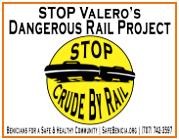Repost from Aljazeera America
‘Bomb trains’: A crude awakening for Richmond, Calif.
Local activists try to halt the shipment of explosive Bakken crude oil through their neighborhoods
RICHMOND, Calif. — The streets are quiet in Lipo Chanthanasak’s neighborhood on the outer edge of this city’s downtown core. Each of the small houses is painted a variation of beige and separated from the road by a neatly kept lawn, as if to highlight the scene’s utter normalcy. But half a mile west are the BNSF Railway tracks and the Kinder Morgan rail facility, which quietly began receiving trains of Bakken crude last year.
Chanthanasak, who moved to Richmond from Laos 24 years ago, lives within the potential blast zone should an oil train derail, according to an online map created by the environmental-advocacy group ForestEthics. The 70-year-old retiree says he only learned that crude was being transported through his community because of his involvement with the nonprofit Asian Pacific Environmental Network, or APEN. Many of his neighbors, he says, are unaware.
Since July 2013, when a train carrying Bakken crude from North Dakota derailed and exploded in Lac-Mégantic, Quebec, killing at least 42 people and flattening the town, major crude-by-rail accidents have occurred in Alabama, North Dakota, Minnesota, Pennsylvania, Virginia and Colorado. ForestEthics says that 25 million Americans live within an oil-train-evacuation zone. An elementary school, a public-housing project and an affluent, elderly community fall within Richmond’s zone, according to the advocacy group.

The transport of crude by rail is not a new phenomenon, but it has increased significantly over the past few years. In the first half of this year, 229,798 carloads of crude were transported by rail, up from 9,500 carloads in all of 2008. The increase is largely connected to the development of the Bakken shale, oil-rich rock formation that lies beneath parts of the northern United States and Canada.
Compared with traditional forms of crude oil, Bakken crude has been shown to be much more volatile and more likely to explode in the event of derailment. Hence the rail cars’ nickname among activists: “bomb trains.” But apart from a code on the side of the cars, nothing about their appearance indicates their origins. Smooth and cylindrical, the black cars would be adorable, if only their contents weren’t so dangerous. Richmond’s Kinder Morgan facility, a rail yard containing very little except several tracks, is just as unassuming. The trains (100 to 120 cars hitched together, all carrying the same product) arrive here, where they are lined up in several rows, each waiting for their content to be pumped into tanker trucks (three tankers are required to hold the contents of a single railcar). The tankers are then thought to travel another 25 miles northeast to a Tesoro Corporation refinery in Martinez.
Previously, the Kinder Morgan facility receiving ethanol by rail. But in September 2013, after securing the necessary air-quality permit granted by the Bay Area Air Quality Management District (without the knowledge of its board), the facility quietly switched over to handling crude. By the time the community found out, in March 2014, through an investigative story by the local CBS station, KPIX, it was already too late. The lawsuit that the nonprofit group Earthjustice filed (on behalf of APEN and others) to halt operations at the terminal was dismissed by the Superior Court of San Francisco in September, because it had been filed after the 180-day deadline.
“It’s a catch-22,” says Andres Soto, an organizer for Communities for a Better Environment, one of the co-plaintiffs in the suit. “How can you even comment unless you knew that something had been done? We would’ve had to be going through public records on a regular basis to discover when they’re making these kinds of decisions.”
Richmond’s case is not unique: In June, a NuStar terminal in Vancouver, Washington, also received an air-quality permit to begin storing crude without public notification. Community resistance has, however, encouraged the Vancouver City Council to adopt an emergency six-month moratorium on new or expanded crude-by-rail facilities.
“It’s very rarely been the case that local representatives or city councils have questioned these things without being encouraged to by local citizens or by being forced to by local action groups,” said Lorne Stockman, research director at Oil Change International and author of two recent reports on the rise of crude-by-rail in North America. “The only way [the projects] have been challenged are because vigilant citizens have questioned them.”
The secrecy that has characterized the projects has been aided by the fact that, in many cases, their introduction requires very little new construction — none at all in the case of Kinder Morgan. That makes the projects virtually invisible. This is also why crude by rail has been economically viable, despite being slightly more costly than transport via pipelines. In addition, pipeline projects normally require 20- to 30-year contracts to recoup their capital investments. Therefore, because the Bakken oil boom is not expected to last, constructing new pipelines to service it often doesn’t make economic sense. Meanwhile, the Bakken region is already connected to the West Coast by existing rail infrastructure. With crude prices higher in the West Coast than elsewhere in the country, and a growing Asian market for North American crude, the transportation of crude by rail to the West Coast is likely to increase unless community resistance proves successful.



 Part of the problem is that no major oil pipelines run across the Rocky Mountains connecting the state to fracking wells in the rest of the country. And building pipelines is a lengthy, expensive process.
Part of the problem is that no major oil pipelines run across the Rocky Mountains connecting the state to fracking wells in the rest of the country. And building pipelines is a lengthy, expensive process.



You must be logged in to post a comment.